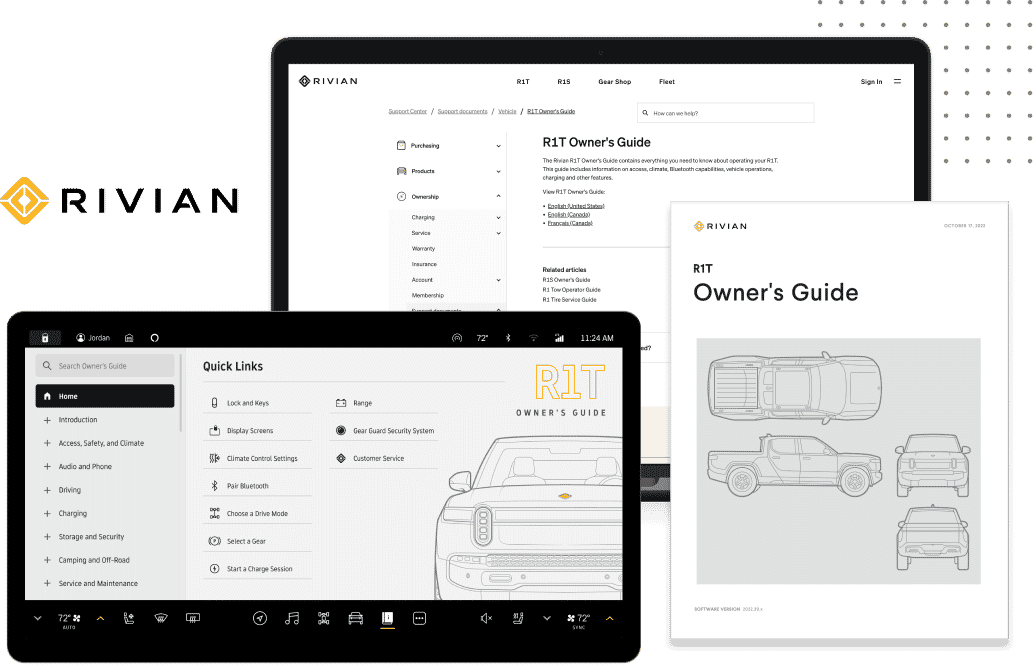In The Press
Humber College Uses MadCap Flare to Deliver Online Humanities Course and Supplemental CD
MadCap Flare Multi-Channel Authoring Software Selected for Ease of Use, Modern Native XML Architecture, and Ability to Link with Blackboard Education Management System
La Jolla, CA, USA – March 31, 2009 – MadCap Software, the leader in multi-channel content authoring and a showcase company for Microsoft (NASDAQ: MSFT) Visual Studio 2005 and Microsoft XPS, today announced that Humber College Institute of Technology & Advanced Learning is using MadCap Flare to update and manage its online Humanities 024 course. Flare, MadCap’s flagship software for multi-channel authoring, also is used to deliver a supplemental CD to accompany the class textbook.1 Humber College Humanities Professor George Byrnes, who created the online class and CD, selected Flare for its ease of use, modern native XML architecture, and ability to seamlessly link with the Blackboard Internet-enabled education management system.
“Blackboard is a very useful online system for posting updates about course work and facilitating communications between students and teachers. However, its online course authoring environment is quite complex, often requiring our IT professionals at Humber to help create the courses,” said Professor Byrnes. “With MadCap Flare, I can easily create and update the humanities course myself, as often as I need, to provide my students the most timely and relevant resources available.”
For nearly two decades, Professor Byrnes has developed course materials to complement the textbook and help his humanities students gain a deeper understanding of the subject matter while learning at their own pace. His first project was to create a supplemental CD with WinHelp. He then later began using Adobe RoboHelp® to update the CD, as well as create an online class. However, technical difficulties with the RoboHelp-based CD, security issues with Adobe FlashHelp, and a decline in RoboHelp® customer support led him to re-evaluate his choice of authoring software. After reviewing several products, Professor Byrnes chose Flare for its modern architecture and easy-to-use features that would speed the learning curve.
“Flare is remarkably simple and provides the perfect what-you-see-is-what-you-get environment to set up an online course using text, links, and photos,” says Professor Byrnes. With its topic-based approach to authoring, he adds, “Flare has the underlying metaphor of a book—using book icons to designate “chapters” of related topics—and that’s a natural connection for most professors. I can set up books with pages and think of the folders as pages within a specific topic.”
For example, the Humanities textbook has five units, but the course is taught over fourteen weeks. Professor Byrnes has chosen to create a chapter icon for each week, as well as additional chapters for Course Policies and other topics. When his online students login to the course and open the Flare-based Course Content Guide, they see the Chapter icons arranged by date. When clicked, each chapter icon opens to display the “Weekly Study Plan” topic immediately. This allows Professor Byrnes to orient his students for the week just as though he is standing before them in class. Equally important, this visual arrangement is exactly what Professor Byrnes sees when he is composing lectures and other course content.
As a result, Professor Byrnes notes, “My students and I are literally on the same page as they study and I teach.”
One of Professor Byrnes’ goals is to encourage students to work with the course material online, which incorporates some 800 HTML pages. Therefore, he has used the WebHelp format in Flare to set up the online course, so that each topic is easy to read and contains active links to relevant source material.
“One of the reasons I’m especially pleased with Flare—and one of the most important things—is how easy it is to integrate a Flare project into Blackboard. When students sign onto the Blackboard system and click on the Course Content Guide, Flare is what they actually see,” said Professor Byrnes. “To get this integration, all I had to do was log into Blackboard, setup a WebDev connection between Blackboard and my computer, and then move the Flare files to the outbound folder. It’s so simple.”
Another important advantage with Flare is MadCap’s support, says Professor Byrnes, who notes, “I’m a Bronze support customer, and I recently had one of the technicians help me out. He was able to log onto my computer, look at my Flare project, and ferret out the lines of code to adjust. It was like watching a surgeon.”
In addition to the online course, Professor Byrnes has also has used Flare to update the CD that supplements the humanities textbook. Referring to it as “the X-ray of the textbook,” he explains that the CD provides summaries of chapters and articles, Internet resources, definitions of 200 distinct terms, and cross-links.
“With Flare, all of my lectures can be cross linked, and they are amplified by all the rich educational resources available on the Internet today,” Professor Byrnes noted. “It really points to the power of using authoring software, like Flare, that has been designed for online information delivery.”
“Humber College Professor George Byrnes is one of the true pioneers in using online media to create a richer, more personalized learning experience for students,” said Anthony Olivier, MadCap co-founder and CEO. “We are thrilled by his success in using MadCap Flare to modernize his CD and online class, as well as seamlessly link with Blackboard. It clearly demonstrates how Flare can empower educators to create and update their own course materials as needed, while maintaining important ties to a college or university’s central education management system.”
About Humber College Institute of Technology & Advanced Learning
Humber, a member of Polytechnics Canada, is committed to student success through excellence in teaching and learning. Based in Toronto, Ontario, Canada, Humber's broad range of career-focused, educational programs include apprenticeship, certificates, diplomas, bachelor's degrees and postgraduate certificates. With more than 350 programs from which to choose, the 19,000 full-time and 55,000 part-time students of Humber have access to many opportunities for continuous learning. For more information, visit http://www.humber.ca.
About MadCap Software
MadCap Software is a trusted resource for thousands of companies around the globe for single-source, multi-channel authoring and publishing solutions designed to streamline the process of developing and delivering training content, learning and development programs, technical documentation, online Help, knowledge bases, and more. From authoring, publishing and translation, to cloud-based content management system, to contribution and review in the cloud, you can streamline content delivery and manage the entire content development lifecycle with MadCap Software. MadCap Software’s services include product training, consulting services, translation and localization, and an advanced developer certification program. Headquartered in San Diego, California, with offices in Austin, TX, MadCap Software is home to some of the most experienced software architects and product experts in the content development industry.




